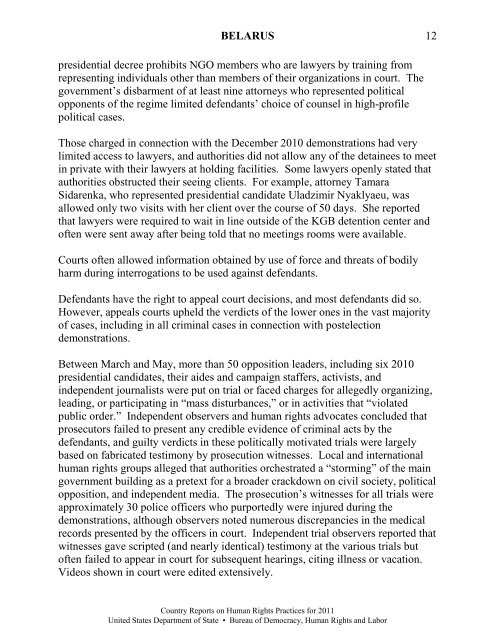belarus executive summary - US Department of State
belarus executive summary - US Department of State
belarus executive summary - US Department of State
You also want an ePaper? Increase the reach of your titles
YUMPU automatically turns print PDFs into web optimized ePapers that Google loves.
BELAR<strong>US</strong> 12<br />
presidential decree prohibits NGO members who are lawyers by training from<br />
representing individuals other than members <strong>of</strong> their organizations in court. The<br />
government’s disbarment <strong>of</strong> at least nine attorneys who represented political<br />
opponents <strong>of</strong> the regime limited defendants’ choice <strong>of</strong> counsel in high-pr<strong>of</strong>ile<br />
political cases.<br />
Those charged in connection with the December 2010 demonstrations had very<br />
limited access to lawyers, and authorities did not allow any <strong>of</strong> the detainees to meet<br />
in private with their lawyers at holding facilities. Some lawyers openly stated that<br />
authorities obstructed their seeing clients. For example, attorney Tamara<br />
Sidarenka, who represented presidential candidate Uladzimir Nyaklyaeu, was<br />
allowed only two visits with her client over the course <strong>of</strong> 50 days. She reported<br />
that lawyers were required to wait in line outside <strong>of</strong> the KGB detention center and<br />
<strong>of</strong>ten were sent away after being told that no meetings rooms were available.<br />
Courts <strong>of</strong>ten allowed information obtained by use <strong>of</strong> force and threats <strong>of</strong> bodily<br />
harm during interrogations to be used against defendants.<br />
Defendants have the right to appeal court decisions, and most defendants did so.<br />
However, appeals courts upheld the verdicts <strong>of</strong> the lower ones in the vast majority<br />
<strong>of</strong> cases, including in all criminal cases in connection with postelection<br />
demonstrations.<br />
Between March and May, more than 50 opposition leaders, including six 2010<br />
presidential candidates, their aides and campaign staffers, activists, and<br />
independent journalists were put on trial or faced charges for allegedly organizing,<br />
leading, or participating in “mass disturbances,” or in activities that “violated<br />
public order.” Independent observers and human rights advocates concluded that<br />
prosecutors failed to present any credible evidence <strong>of</strong> criminal acts by the<br />
defendants, and guilty verdicts in these politically motivated trials were largely<br />
based on fabricated testimony by prosecution witnesses. Local and international<br />
human rights groups alleged that authorities orchestrated a “storming” <strong>of</strong> the main<br />
government building as a pretext for a broader crackdown on civil society, political<br />
opposition, and independent media. The prosecution’s witnesses for all trials were<br />
approximately 30 police <strong>of</strong>ficers who purportedly were injured during the<br />
demonstrations, although observers noted numerous discrepancies in the medical<br />
records presented by the <strong>of</strong>ficers in court. Independent trial observers reported that<br />
witnesses gave scripted (and nearly identical) testimony at the various trials but<br />
<strong>of</strong>ten failed to appear in court for subsequent hearings, citing illness or vacation.<br />
Videos shown in court were edited extensively.<br />
Country Reports on Human Rights Practices for 2011<br />
United <strong>State</strong>s <strong>Department</strong> <strong>of</strong> <strong>State</strong> • Bureau <strong>of</strong> Democracy, Human Rights and Labor
















